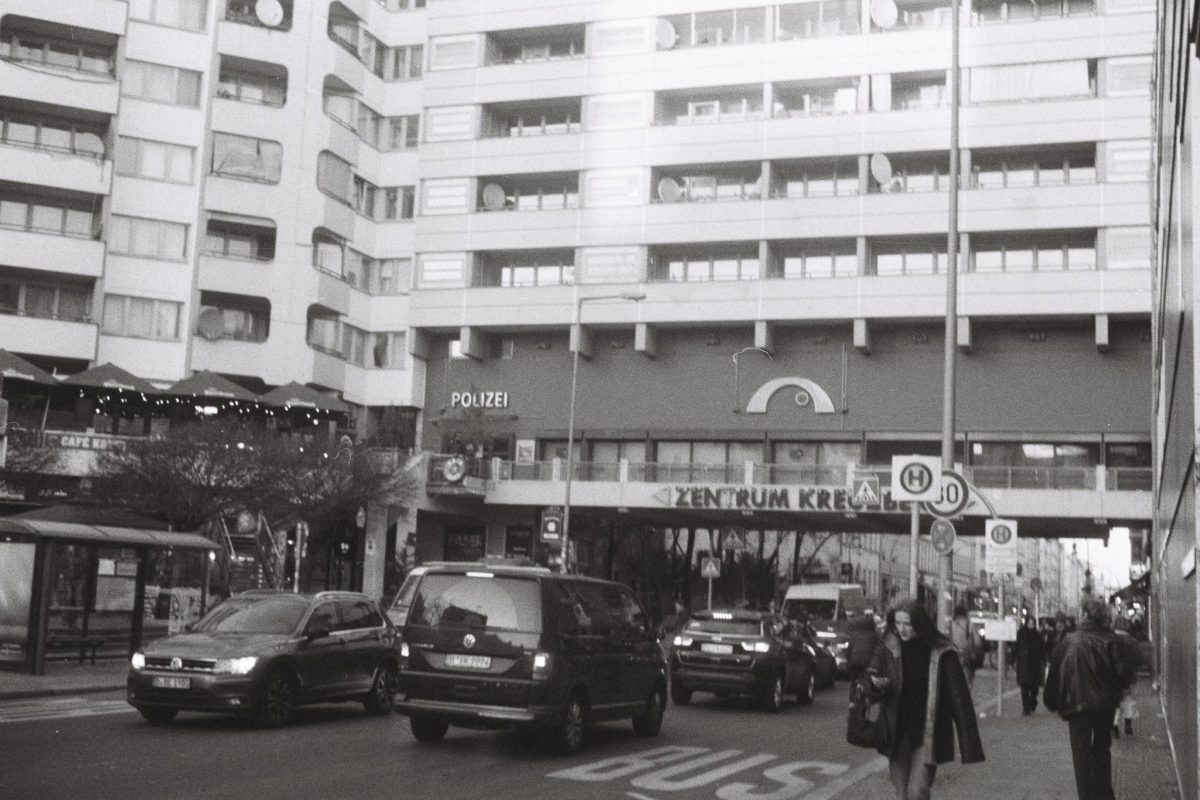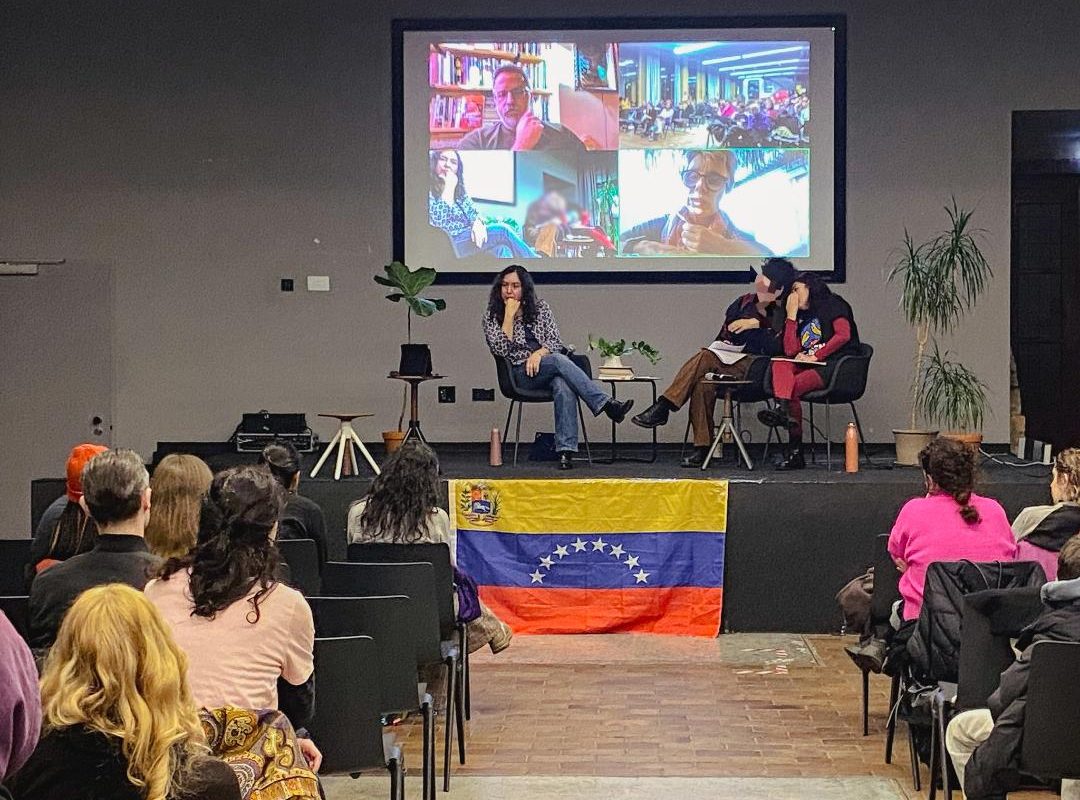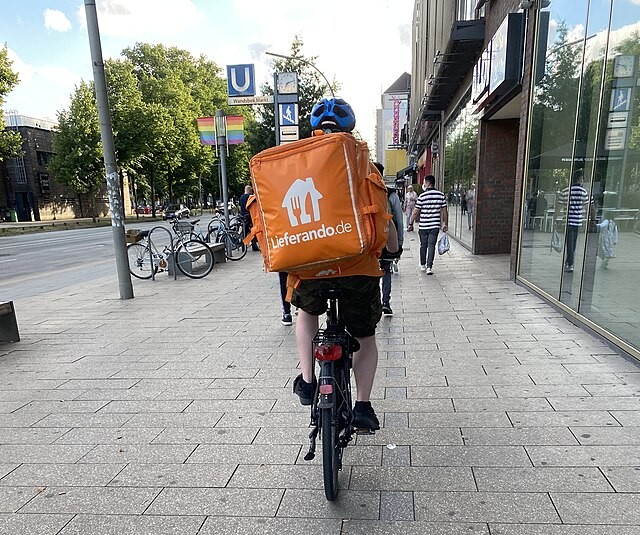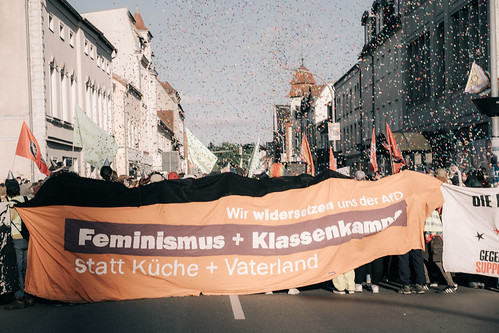Hello Elif. Thanks for talking to us. Could you start by introducing yourself? Who are you and what is your political background?
I’m Elif Eralp. I’m 41 and come from Hamburg. I’m from a socialist family – that was the reason my parents came to Germany. My mother was 8 months pregnant with me when she came here. My parents took me to various demonstrations. Particularly important were the demos after the racist attacks in Mölln and Solingen.
I started in the anti-nuclear power movement in Hamburg, then the Berlin anti-racist group Allmende. That was when the Sarrazin debate was very strong. We also did a lot around gentrification and forced evictions. As a small organisation we were also evicted. I also strongly supported the Kurdish movement, for example in the HDP election campaign.
In 2017, I joined Die LINKE because of the debate around migration, to strengthen the progressive forces in the party. 2017 was also the first year that the AfD came into the Bundestag. I helped build a network of migrants in the party – Links*Kanax. We were strongly engaged in the debate about open borders.
We wanted to let people hear the voice of people affected by racism and ensure that people with a history of racism are not pushed around. We observed that we were unfortunately a very white party, and wanted to change this. Links*Kanax works with extra-parliamentary anti-racist and migrant movements. We are trying to connect the dots and to motivate people to engage themselves for the party so that it becomes more diverse.
Last September, you were voted into the Berlin parliament. What are your impressions so far of the Red-Green-Red government in Berlin?
From the beginning there was a very difficult discussion with an SPD under Giffey, which has followed a different course to the last Red-Red-Green government. This SPD is clearly aiming at conservative milieus and CDU voters, and carried out a very problematic election campaign – emphasizing Law and Order, and criminalising migrant milieus with the so-called “Clan Debate”
The social balance of forces is unfortunately difficult to change, even though we won the Volksentscheid. But DWE has managed to popularise an ur-Left radical subject which attacks the social structure and capitalism so much that people are prepared to support it
The initial conditions were not very good for a Red-Green-Red coalition. Added to that, die LINKE lost responsibility for city development. This was a problem for Deutsche Wohnen & Co Enteignen (DWE) as the Greens were unclear on the referendum, and the SPD opposed it. But for us, it’s the most important issue of all.
But I also see opportunities, and believe we should wait a year to see if we reach a breaking point. If DWE is ignored, we must talk about exit scenarios. But now we’re in, and my experience is that we can change things and make progress. In the coalition agreement, the section on participation, migration and anti-discrimination is very good.
Having said this, senators are already not respecting the ban on night deportations. But there is definite progress on voting rights. So there are successes, but also failures. There is a continual fight in many areas, particularly regarding domestic policies like housing and migration.
Let’s start with the simplest question about voting rights. Who can vote in Berlin and who can’t?
For the general and council elections, and for Volksentscheide, only German citizens are eligible to vote. On a municipal level, EU citizens can vote for the BVV, but not third country nationals. This means that 20% people in Berlin are excluded – in my constituency it’s over 35%, though some of them can vote in the BVV elections.
You are providing legal advice for the new People’s initiative Demokratie für Alle. It the moment, the campaign is trying to collect 20,000 signatures. What happens then?
In the coalition agreement, the Berlin government has promised to initiate a Bundesrat initiative to change the constitution, and also to see what is legally possible on a local level. Although the national constitution currently refers to “the people”, not “the German people”, in practise it currently only applies to German citizens.
After decades of migration, Germany should be finally recognised as a country of migration. The general public has become, in general, more willing to accept that migration and a diverse society are the normal state of things. This is why I think that German states should be able to extend the vote to people who do not have German citizenship.
The demand for voting rights is very old. The Gastarbeiter generation – the generation of my parents – also made this demand. The People’s Initiative is applying more pressure from civil society. I hope that the Berlin Senat grants voting rights, but if this doesn’t happen, I and my party will support a referendum with all our powers.
Very many people in my constituency are very dissatisfied. Some don’t engage in politics, saying “I don’t have a vote anyway”. This is why it’s great to involve more people around issues like high rents and structural racism. We need to get more people involved and to demand that things change.
The right to vote is a basic democratic right, so that everyone who is affected by these laws can vote to change them. It’s unbelievable that so many people were not allowed to vote in the Volksentscheid. Many people with a migration background are affected by forced evictions, but they’re not allowed to vote on something that could solve this.
What about the demand for voting rights for 16 and 17 year olds?
The People’s Initiative also calls for voting rights from 16. Berlin is able to grant voting rights to 16 and 17 year olds on its own. In the constitution voting at 18 only applies to the Bundestag and not to regional elections. We are already talking with the opposition FDP, who also put the demand in their election manifesto. FDP support is necessary to get the two-thirds majority necessary to change the regional constitution.
What do the other parties in the Senat say about voting rights for non-Germans?
In Berlin the coalition partners are in agreement. The lack of voting rights for non-Germans is a form of discrimination. This is written in the coalition agreement. We have committed ourselves to find ways of improving active voting rights for non-Germans on a regional level.
There are legal complications following a court decision made in Bremen in 2014. But Bremen is only one of 16 constitutional courts. I’d have preferred it if the Berlin Senat had said we’ll implement it anyway, but the coalition decided that because it is legally unclear, we’ll first assess what is possible.
We have also agreed to bring an initiative into the Bundesrat. We hope to apply so much pressure – together with actors from civil society like the People’s Initiative – that change will come on a national level. But it’s not in the national coalition agreement so it might not happen.
In Berlin we also have the problem that the Berlin constitution explicitly refers to German citizenship in its section on voting rights. This means that we need to change the constitution, which needs a two-thirds majority. We must still try to win over one of the other democratic parties, and voting rights for non-Germans was not in the manifestos of the FDP and CDU.
This is where the People’s Initiative is very important for applying pressure, not just on the governing fraction but also on the opposition.
Many people are sceptical, both about legal change (after the Mietendeckel) and whether referenda will be implemented (after DWE). How can we be so sure that a Berlin government will implement these changes? The precedents aren’t great.
The DWE Volksentscheid was not a binding draft law, and was dependent on the political commitment to implement it. But for me as a councillor, a citizen and a member of the governing fraction, when 60% of people vote for something, it’s binding.
In the case of voting rights, I am very hopeful, because it’s there clearly in the coalition agreement. We have the political commitment from the SPD, Greens and LINKE that we want to extend voting rights,
But getting the FDP or the CDU on board won’t be so easy. For this reason I hope that there will be massive pressure on the opposition fractions so that we can implement the change.
How can people who are not sitting in the Senat apply pressure so that their demands are respected?
This is what I’ve been doing as an anti-racist activist for many years, and what I’m continuing to do. Organise meetings, take to the streets, have rallies and demonstrations around the issues. Publicise it all on social media. Everyone can collect signatures, whatever their nationality. Many people with a migration background collected signatures for DWE.
The responsible councillors in the LINKE fraction are also going to have talks with the People’s Initiative. There are also many migrant organisations working on publicising the issue. There are so many different ways that people can take part, even if they’re not negotiating with the political decision makers.
Talking about DWE, at the moment there’s a great helplessness among people who in the last two years have done little else but collect signatures, organise meetings, etc. How can you convince such people that it’s worth it? I know people who are still ready to do something, but are simultaneously asking whether the system will allow it.
Changing the voting age and socialisation are milestones. Socialisation is such a serious attack on capital that if it happens it would be a historic event. That’s why it is absolutely worth fighting for. The socialisation of the housing market is central to me because if we implement it it would finally mean homes for people who live in them and not for making money for a few. The goal is so great that it deserves a great deal of effort.
But I can absolutely understand frustration. I’m also pretty frustrated, although I’m part of the process. It is frustrating to know we won, but we’re not sure whether it will even be implemented. That’s down to the balance of forces, which also lie with economic cartels, real estate traders, and political decision makers who are partly interwoven with the real estate lobby, by whom thy are financed.
The social balance of forces is unfortunately difficult to change, even though we won the Volksentscheid. But DWE has managed to popularise an ur-Left and radical subject which attacks the social structure and capitalism so much that people are prepared to support it – even some CDU voters, because of the urgency of paying too high rents.
It is a massive victory which affects other European countries, which are trying something similar, and in other German Bundesländer like Hamburg. There are many examples. I’m convinced that it will be implemented.
I’m trying to take the Commission as a chance, though much depends on who will be in the Commission. There’s also justified criticism of its way of working. But I think that we have not lost this fight. As it is such a large subject that is so widely discussed that I hope that it’s still a great victory. I hope that we will win.
One final question. The main public of our website is non-Germans in Berlin – one in four Berliners don’t have a German passport. You already said that many people feel excluded from German politics, because of language, voting rights, whatever. How can people without voting rights practically engage in politics here?
There are many different ways. My father is very engaged, although he has no voting rights. There are various alliances, extra-parliamentary initiatives, action groups against racism. There’s Fridays for Future, alliances against rent madness, the Alliance for sexual self-determination. For each socially relevant subject there’s a group where you can get active.
Our party wants to being together all milieux – not just the climate movement, not just the anti-racist movement, not just the tenants’ movement. We want to bring all these subjects together and to address the difference milieus and groups. That’s why I find it important that people get active in parties which have a complete social concept, and doesn’t just look at individual issues, For us, this complete social concept is democratic socialism, even though we want to implement many reforms on the way.
As well as parties, it’s great if people engage in People’s Initiatives. This is one of the few available elements of direct democracy, even though it can be very frustrating, especially if you’re not allowed to put a cross on a ballot paper. But you can collect signatures, you can make publicity. This is why expropriation has become an issue in a neoliberal country like Germany. It has been achieved by people who are not all German citizens.




